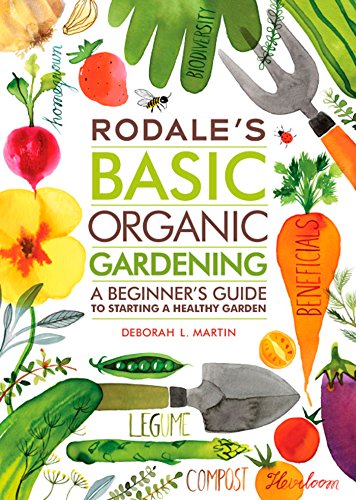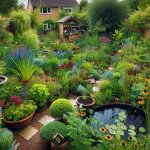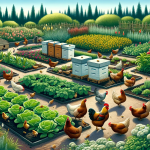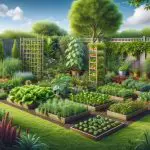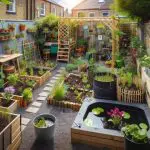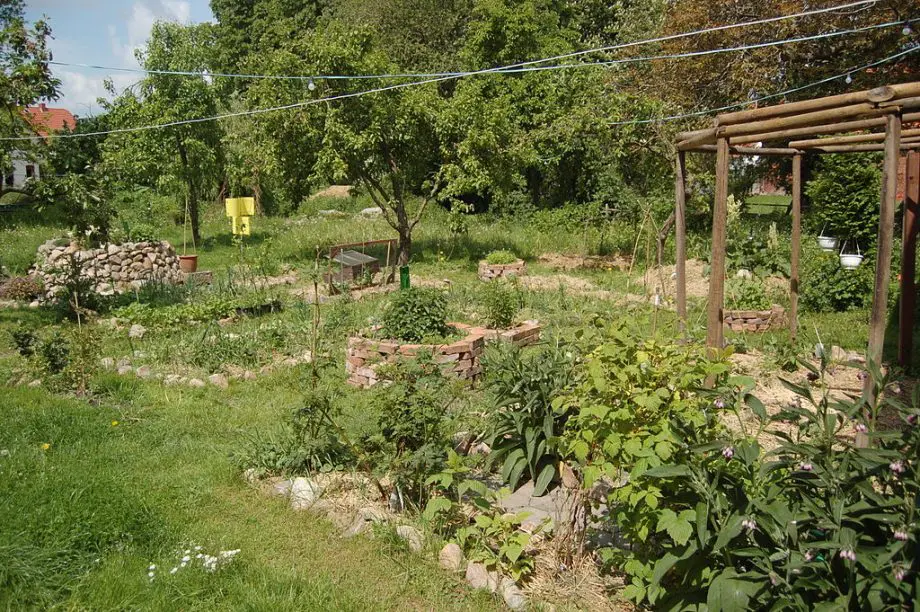
Dive into the world of organic gardening for beginners with our easy guide! Discover simple, effective tips to grow your own organic haven, even if you’re a first-timer.
Organic Gardening Key Takeaways:
- Organic gardening for beginners involves starting with easy-to-grow plants.
- Preparing soil organically, and using natural pest control methods.
- It’s an eco-friendly approach to gardening, ideal for those new to growing their own food sustainably.
Welcome to the green, thriving world of organic gardening for beginners!
Whether you’re a total newbie or just looking to go organic, this guide is your friendly companion to start an organic garden and cultivate a lush, natural garden.
Let’s turn those green dreams into reality, one plant at a time!
Introduction to Organic Gardening for Beginners
Embarking on the journey of organic vegetable gardening for beginners can be a rewarding and transformative experience.
It’s not just about growing plants; it’s about embracing a lifestyle that harmonizes with nature.
For beginners, the world of organic gardening might seem vast and complex, but it’s filled with simple joys and valuable lessons.
Whether you’re looking to cultivate your food, create a sustainable backyard ecosystem, or just enjoy the therapeutic benefits of gardening, this guide will provide you with the essential knowledge and skills to get started.
So, roll up your sleeves, and let’s delve into the enriching world of organic gardening, where every seed sown is a step towards a healthier, greener planet.
Understanding Organic Gardening
Stepping into organic gardening opens up a world where nature takes the lead.
It’s about more than just avoiding synthetic chemicals and fertilizers.
It’s a harmonious dance with the environment, nurturing your garden with natural methods.
As you embark on this eco-friendly journey, you’ll discover the joys of working alongside nature, creating a space that’s not only good for your table but for the planet too.
So, let’s unfold the layers of organic gardening together and see how this green approach can turn your garden into a vibrant, sustainable oasis.
Organic gardeners emphasize building soil organic matter and then rely on natural sources of supplemental nutrients. Many people garden organically because of concern over pesticide residues on food. ag.umass.edu
What is Organic Gardening?
Organic gardening is a holistic approach to plant cultivation, focusing on natural processes and materials.
Unlike conventional methods, it starts by ditching synthetic chemicals and fertilizers, relying instead on organic matter and biological diversity.
This approach not only nurtures healthier plants but also contributes to environmental conservation and sustainability.
Principles of Organic Gardening
- Natural Fertilizers and Pesticides: Organic gardens thrive using compost, manure, and biological pest controls instead of synthetic chemicals.
- Soil Health: Central to organic gardening is maintaining soil fertility by nurturing its microbial life.
- Biodiversity: Planting a variety of species promotes a balanced ecosystem, reducing pest outbreaks and improving overall garden health.
Organic Horticulture
Organic horticulture is the science and art of growing fruits, vegetables, flowers, or ornamental plants by following the essential principles of organic agriculture in soil building and conservation, pest management, and heirloom variety preservation. Wikipedia
J.I. Rodale and the Rodale Institute:
Pioneering the Organic Gardening Movement
The Rodale Institute is a pivotal organization in the world of organic gardening, founded by J.I. Rodale in 1947.
J.I. Rodale was a visionary who played a crucial role in popularizing organic gardening, bringing this sustainable approach to the mainstream.
His commitment to organic methods stemmed from a belief in their environmental, health, and social benefits.
The institute, under his guidance and later that of his family, has been at the forefront of research and advocacy for organic farming practices.
It focuses on educating farmers, scientists, and the public about the advantages of organic farming, which aligns well with sustainable living and environmental conservation. The Rodale Institute’s influence extends globally, significantly shaping the organic movement.
The Rodale Institute
Rodale Institute is a non-profit organization that supports research into organic farming. It was founded in Emmaus, Pennsylvania in 1947 by J. I. Rodale, an organic living entrepreneur. After J.I. Rodale died in 1971, his son Robert Rodale purchased 333 acres and moved the farm to Kutztown, Pennsylvania.
Rodale Institute uses a long-term, side-by-side research trial model to compare organic and conventional agriculture. Its longest running experiment, the Farming Systems Trial, has been running since 1981 and compares organic and conventional corn, soybeans, and other grains. The institute also researches the effects of growing food without chemical pesticides, herbicides and fertilizers on human health, water quality, climate change, and more.
Rodale’s Basic Organic Gardening: A Beginner’s Guide to Starting a Healthy Garden
Garden Basics for Beginners
Welcome to the foundational chapter of organic gardening for beginners!
Here, we strip back the complexities and return to the roots of gardening.
It’s all about embracing the basics, understanding the rhythm of nature, and using simple, effective tools and techniques.
As you start this journey, remember that every great gardener once started with a single seed and a patch of earth.
So, let’s get grounded in the essentials and grow our gardening knowledge from the soil up.
Together, we’ll explore the fundamental steps to cultivate a flourishing organic garden.
Embracing the Simplicity of Organic Gardening
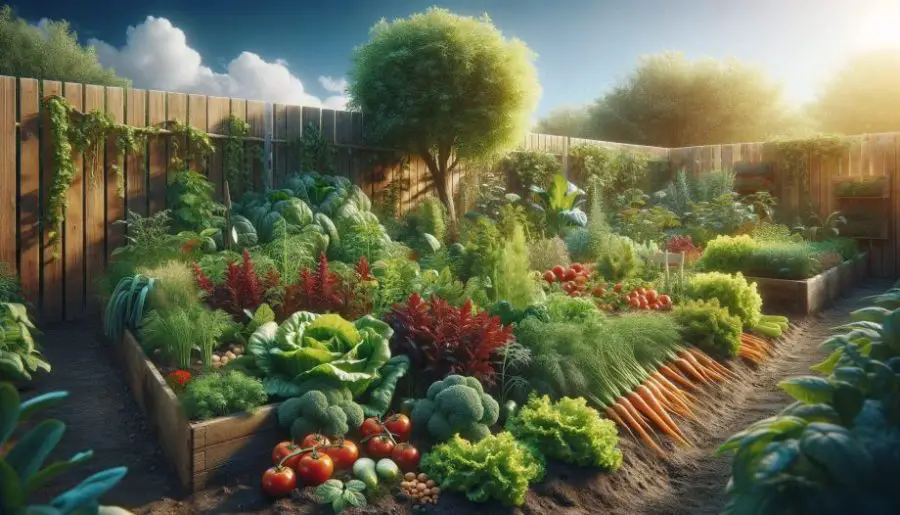 Organic gardening, at its core, is a return to the natural methods our ancestors used.
Organic gardening, at its core, is a return to the natural methods our ancestors used.
It’s about observing and learning from nature, using hands-on techniques and patience.
This approach demystifies gardening, making it accessible and enjoyable for beginners.
Essential Tools for the Organic Gardener
- Basic Toolkit: Start with simple, essential tools like a shovel, rake, wheelbarrow, and watering can.
- Observation: Your eyes and hands are invaluable in understanding and responding to your garden’s needs.
Planning Your Organic Garden
Starting organic gardening is an exciting adventure, and like any great journey, it starts with a solid plan.
This section is all about laying out the blueprint for your organic garden.
We’ll explore how to choose the perfect spot, how to tailor your garden to fit your lifestyle, and how to plan for success from the ground up.
Think of it as creating a roadmap for a lush, thriving garden that aligns with your environment and personal preferences.
Let’s plot out the path to a bountiful, organic oasis!
Laying the Groundwork for Success
Before you dig into the earth, planning is crucial. A well-thought-out garden plan ensures your efforts bear fruit, literally and figuratively.
Understanding the fundamentals helps in creating a thriving organic space.
Determining the Best Location
- Sunlight and Shade: Identify areas in your yard that receive ample sunlight, essential for most plants.
- Accessibility: Consider the proximity to water sources and ease of access for regular maintenance.
- Protection: Account for local wildlife and implement measures to protect your garden if necessary.
Choosing Your Garden Beds
Venturing further into organic gardening, let’s talk about choosing the right home for your plants – your garden beds.
This crucial step shapes the heart of your garden. Whether you have sprawling backyard space or a cozy balcony, there’s a garden bed type just right for your needs.
From raised beds to in-ground plots, each has its charm and advantages.
In this section, we’ll guide you through selecting the ideal garden bed, ensuring your organic garden not only thrives but also fits beautifully into your lifestyle and space.
Selecting the Right Type for Your Needs
The choice of garden beds is a critical step in setting up your organic garden.
Each type offers unique benefits and can be tailored to suit your space and gardening goals.
Types of Garden Beds
- Raised Beds: Ideal for small spaces and poor soil conditions. They offer better control over soil quality and are easier to maintain.
- In-Ground Beds: Suitable for larger areas with decent natural soil. They are more traditional and can accommodate a wider range of plants.
- Container Gardening: Perfect for urban settings or limited outdoor space. Containers are versatile and can be placed on patios, balconies, or indoors.
Preparing the Soil
Delving deeper into ‘organic gardening for beginners’, we now turn our focus to the foundation of all gardening success – the soil.
Preparing your soil is like setting the stage for a grand performance, where your plants are the stars.
This section is dedicated to enriching and nurturing your garden’s soil, ensuring it’s primed to support healthy and vibrant plant growth.
We’ll explore how to test your soil, amend it organically, and create the perfect environment for your garden to flourish.
Get ready to get your hands dirty in the most rewarding way!
Building a Strong Foundation
Healthy soil is the backbone of any successful organic garden. It’s crucial to start with soil that supports plant growth and encourages a vibrant ecosystem.
Soil Testing and Enrichment
- Soil Test: Begin with a soil test to understand its composition and pH level. This information guides how you can improve the soil.
- Compost: Incorporate compost to enrich the soil with nutrients and improve its structure, fostering a thriving environment for your plants.
Selecting Seeds and Plants
In organic gardening choosing the right plants and seeds is like casting characters for a play, each bringing its unique beauty and flavor to your garden.
In this part, we focus on aligning your garden with your taste buds and climate, ensuring that every seed sown turns into a cherished part of your organic haven.
We’ll delve into selecting varieties that not only thrive in your garden conditions but also excite your palate.
Let’s embark on this exciting phase of planning, where your preferences and nature’s offerings meet to create a bountiful, organic feast!
Choosing the Right Crops for Your Garden
Selecting the right plants and seeds is a critical decision in organic gardening.
It’s about finding the balance between what you love to eat and what grows best in your garden’s conditions.
Factors to Consider in Plant Selection
- Personal Preferences: Grow what you love to eat. Focus on vegetables and herbs that you enjoy.
- Climate Suitability: Choose plants that are well-suited to your local climate and growing conditions.
- Seed Quality: Opt for organic, untreated seeds to ensure they are free from synthetic chemicals.
Crop Planning
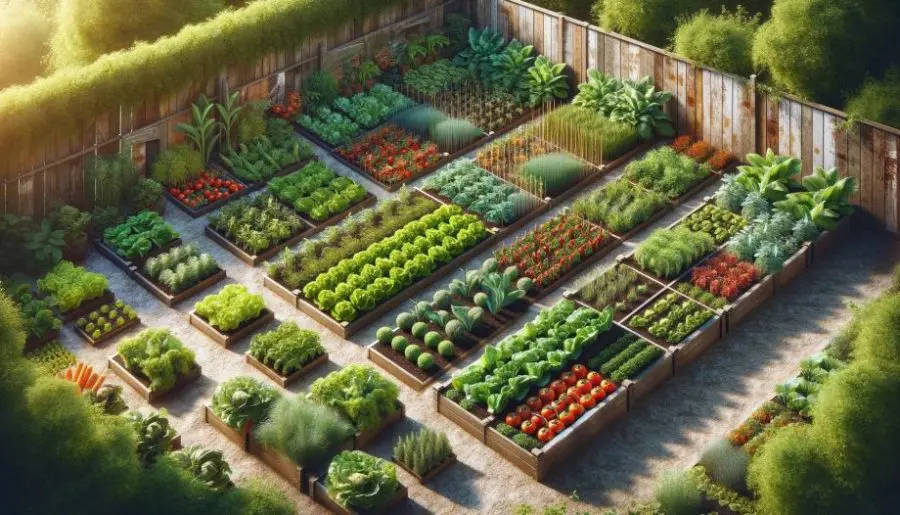
As we progress in our organic gardening guide, we arrive at the strategic phase of crop planning.
This step is akin to orchestrating a symphony, where timing and arrangement play pivotal roles.
Here, we’ll navigate the art of planning what to plant and when ensuring each crop gets its moment to shine.
From understanding seasonal needs to the importance of crop rotation, this section is all about making informed decisions that lead to a diverse and abundant harvest.
Let’s equip you with the knowledge to efficiently map out your garden’s yearly cycle, turning it into a productive and sustainable oasis
Organizing Your Garden for Optimal Growth
Effective crop planning is essential in organic gardening. It helps you maximize space, time, and resources, ensuring a bountiful harvest.
Planning Your Crops
- Seasonal Categorization: Label each crop as a cool or warm season plant, tailoring your planting schedule accordingly.
- Rotation Strategies: Rotate crops annually to prevent soil nutrient depletion and reduce pest and disease problems.
Maintaining Your Organic Garden
In the wonderful world of organic gardening, consistent maintenance is the key to nurturing a thriving garden.
This section is all about the daily care and love your garden requires to flourish.
We’ll explore practical tips for watering, weeding, and overall garden upkeep.
Think of it as a daily routine that not only benefits your plants but also offers you a chance to connect with nature and find peace in your green sanctuary.
Let’s dive into the practices that will keep your organic garden lush, productive, and healthy throughout the seasons.
Nurturing Your Garden to Thrive
Maintenance is key in organic gardening. Regular care ensures your plants grow healthy and strong, providing a bountiful harvest.
Key Maintenance Practices
- Watering: Establish a consistent watering schedule, keeping the soil moist but not waterlogged.
- Weeding: Regularly remove weeds that compete with your plants for nutrients and space.
- Mulching: Use organic mulch to retain moisture, regulate soil temperature, and suppress weeds.
End-of-Season Care and Preparation
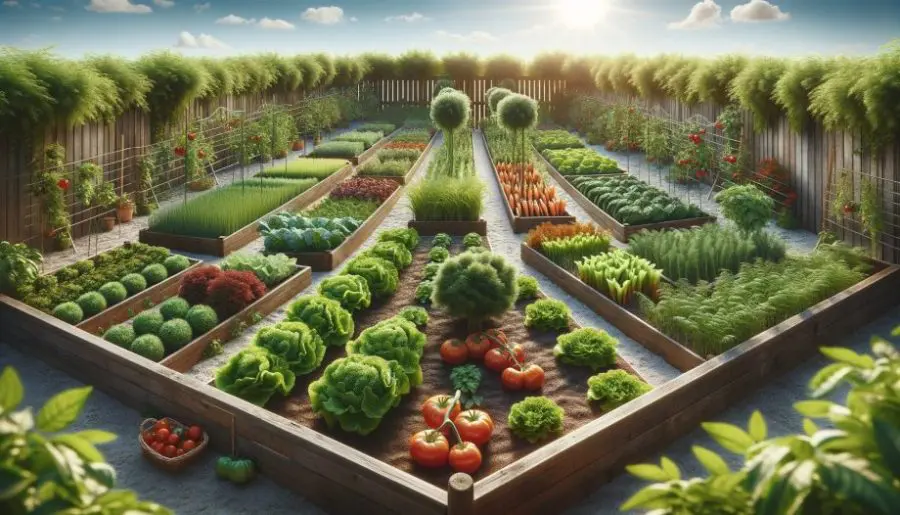
As our journey into organic gardening nears its seasonal close, it’s time to focus on end-of-season care and preparation.
This crucial phase is about wrapping up the current season’s achievements and setting the stage for future growth.
In this section, we’ll guide you through the essential steps to close your garden thoughtfully, from harvesting the last of your produce to preparing your soil for the next planting cycle.
It’s a time to reflect on the year’s growth and plan for an even more fruitful future. Let’s ensure your garden is tucked in and ready for its rejuvenating rest.
Wrapping Up and Preparing for Next Season
Proper end-of-season care sets the stage for your garden’s future success.
It’s about both concluding the current season and laying the groundwork for the next.
Essential End-of-Season Steps
- Harvesting: Collect and enjoy the fruits of your labor, ensuring all produce is harvested.
- Cleanup: Remove plant debris and spent plants to reduce the risk of pests and diseases.
- Soil Enrichment: Add compost or organic matter to replenish and enrich the soil for the next planting season.
FAQs on Organic Gardening for Beginners
Navigating the world of organic gardening can bring up many questions, especially for beginners.
To help you on your journey, we’ve compiled a list of frequently asked questions, providing insights and guidance to make your gardening experience enjoyable and successful.
Q: What is the easiest crop to grow organically?
A: Herbs like basil and mint, leafy greens such as lettuce and spinach, and root vegetables like carrots and radishes are among the easiest crops to grow organically.
They require minimal special care and are less prone to pests and diseases.
Q: What should a beginner gardener start with?
A: Beginner gardeners should start with planning their garden.
Choose easy-to-grow plants that are hardy and require minimal maintenance.
Herbs, lettuce, tomatoes, cucumbers, and beans are great choices for those new to gardening.
Q: What are the easiest vegetables to grow for first-time gardeners?
A: For first-time gardeners, easy vegetables include lettuce and other greens, tomatoes, cucumbers, bell peppers, zucchini, and green beans.
These vegetables are not only easy to grow but also produce a rewarding harvest.
Q: How do I start a garden with no experience?
A: Start with research and planning. Choose a suitable location for your garden, decide on the type of plants you want to grow, and learn about their needs.
Begin with a small garden and gradually expand as you gain confidence and experience.
Q: What knowledge do you need to be a gardener?
A: Do your research and learn basic knowledge in selecting the right plants for your climate.
Experience is also a great teacher so get started and learn as you grow.
Learning about understanding soil types and how to enrich them organically, proper watering techniques, and how to deal with common pests and diseases organically is essential for a gardener.
Q: When should I start my garden starts?
A: The timing for starting your garden varies depending on your climate and the plants you’re growing.
Generally, start seeds indoors 6-8 weeks before the last expected frost date for your area for summer crops. For fall crops, start seeds in late summer.
Conclusion: Embracing the Journey of Organic Gardening
Reflecting on the Organic Gardening Experience
As we wrap up our guide on organic gardening for beginners, it’s important to reflect on the journey you’re about to embark on.
Organic gardening is more than just a method of cultivation; it’s a step towards a sustainable and healthier lifestyle. It connects us with nature and teaches patience, care, and respect for the environment.
Growing Forward
- Continuous Learning: Gardening is a lifelong learning process. Embrace both successes and challenges as opportunities to grow.
- Community Engagement: Connect with other gardeners. Share experiences, tips, and harvests to build a supportive gardening community.
- Environmental Impact: Remember, every organic garden contributes to ecological health, supporting biodiversity and reducing chemical usage.
Why is Organic Fertilizer Better Than Chemical Fertilizer? – Sustainably Forward
Permaculture Gardening: Best Tips for Beginners – Sustainably Forward

